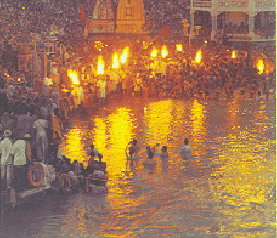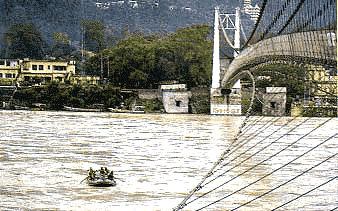![]()
|
Aarti being performed on the banks of the Ganga
Haridwar, 214 km northeast of Delhi, is at the base of the Shivalik hills, where the Ganga, coming down from the mighty Himalayas, meets the plains. Amongst the many pilgrimage spots that are situated along the length of the holy Ganga, Haridwar, perhaps, is the holiest in the land. Literally translated, Haridwar means the 'Gateway to the abode of gods'. Its long history, which goes back to pre-historic times, has lent it many names. In Hindu mythology, it is known as Kapilsthan. Legend has it, that the Suryavanshi Prince Bhagirnath, performed penance here, to salvage the souls of his ancestors, who had perished, due to the curse of the sage Kapila. The penance was answered, and the river Ganga trickled forth from Lord Shiva's locks, and its bountiful waters revived the sixty thousand sons of King Sagara. Amongst its other names, are Gangadwar, and Tapovan. Known also as 'Mayapuri' in the Puranas, it is mentioned in the memoirs of the celebrated Chinese traveller, Hieun Tsang. According to the myth attached to Haridwar, drops of nectar churned out from the primordial ocean, fell at the four sites of the Kumbh fair, which included Haridwar. The Kumbh, and the Ardh Kumbh fairs are grand events, when millions of devoted Hindus take a holy dip in the Ganga.
What to See | How to Get There | Where to Stay | When to Visit | Contact
Har-ki-Pauri This is one of the most famous bathing ghats at Haridwar. The best time to visit this spot, is at sunset, when you can see the 'Aarti' of Ganga being performed. A daily ritual, it is a breathtaking sight, as thousands of earthern lamps light up the night. Bhimganga Tank On the way to Rishikesh, this tank is said to have been made by Bhim, with a jab of his knee, when the Pandavas were going to the Himalayas through Haridwar. Canal Centenary Bridge Located near Har-ki-Pauri, this bridge commands a beautiful view of the canal, and all the ghats. Parmarth Ashram About six kms, on the way to Rishikesh, is this Ashram, housing a beautiful image of Goddess Durga. Manasadevi Temple Situated on the Vilwa Parvat, it can be reached on foot, by road, or through the ropeway. Chandi Devi Across the main Ganga river, on the other bank, is the Neel Parvat, on top of which is the Chandi Devi temple. The summit can be reached, after trekking for about 3 km on the hill. Daksha Mahadev Temple and Sati Kund Located at Kankhal, which is one of the five sacred places around Haridwar, the site has a story attached to it. Legend has it, that Daksh Prajapati, Sati's father, performed a yagna at this place. He did not invite Lord Shiva. Sati, feeling insulted, consequently, burnt herself in the Yagna Kund, here. Pawan Dham The Ashram, here, is famous for its Hanuman temple, built with pieces of glass.
Haridwar is 24 kms from Rishikesh, by road. They are well connected by rail to Howrah (1438 kms), Bombay (1574 kms), Delhi (199 kms), Lucknow (475 kms), Agra (365 kms). Dehradun, Jolly Grant, Bhaniawala airports are connected to Delhi and Lucknow.
Aarti, Railway Station Road (Tel: 427456). Amba Niwas, Choti Sabzi Mandi, Vishnu Ghat.
The best season to visit, is between May and October/November.
Regional Tourist Office, Upper Road (Tel: 427370). UP Tourist Information Bureau, Near Bus Stand, Station Road. Laxman Jhoola
Surrounded by hills on three sides, Rishikesh is located on the right bank of the Ganga, at its confluence with the Chandrabhaga stream. One of the holiest places on the upward pilgrimages to the Himalayas, Rishikesh is, where Raibhya Rishi did penance to please God, who appeared as Hrishikesh, hence the name, Rishikesh. Millions of Hindus come here every year, to absolve themselves of their sins by bathing in the holy Ganges. Rishikesh abounds in stories of renunciation, meditation, penance and salvation. It has developed into one of the better known centres, for schools of yoga and meditation. Rishikesh is also significant as the trekking base, to the Himalayan shrines of Yamunotri, Gangotri, Kedarnath and Badrinath.
What to See | How to Get There | Where to Stay | When to Visit | Contact
Laxman Jhoola 5 kms north of Rishikesh, is the spot where Sri Laxman, is said to have performed Tapa. The Laxman temple was built in his memory. Till 1889, there was just a hanging jute ropeway without pillars. The same structure was, later, rebuilt with iron ropes. Neel Kanth Mahadev The temple, situated at a height of 5,500 ft. above sea level, is about 2 kms from Laxman Jhoola. The trek up to the temple, gives a fantastic wide - angled view of the Himalayan peaks, Babhar forests and the plain below. Bharat Mandir The oldest temple in Rishikesh - the black statue of Vishnu, here, is supposed to have been consecrated by Sri Sankaracharya, in the 9th century. The event is commemorated, during Vasant Panchami, to mark the onset of spring.
Rishikesh is 238 km from Delhi by road.
Arvind Lodge, Yatra Bus Stand. Vanaprast Ashram, next to Ved Niketan, Swarg Ashram.
The best season to visit is between May and October/November.
The UP Tourist Office, Nehru Park, Railway Road (Tel: 30209) |
News | Culture | Economy | Sports | Tourism | Polity | Magazine | Info
Media | Science & Tech. | Social Issues | Foreign Relations | States
What's New | Search | Home

